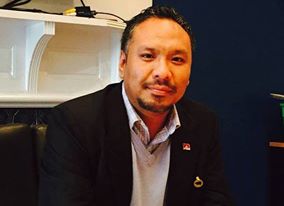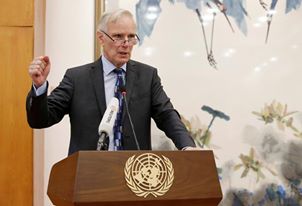An interview with TYC President Tenzin Jigme
By Lobsang Tenchoe
As the tenure of the 15th Central Executive Committee of Tibetan Youth Congress, the largest Tibetan non-governmental organization endorsing complete independence, nears completion, Tibet Express got up-close and personal with the TYC President, Tenzin Jigme.
Tibet Express (TE): Three years (2013- 2016) have almost come to an end; tell us about the core issues you have dealt with during your tenure. How has the experience been like?
Tenzin Jigme (TJ): Yes, the 15th Centrex of TYC has come to an end. When we took charge in 2013, the organization was going through trying times as eight regional chapters had parted ways with the Central Tibetan Youth Congress. The societal perceptions at that time labeled Rangzen advocates as anti-Dalai Lama. In retrospect, although we ought to have dedicated more of our time confronting and planning protests against the Chinese government as the situation in Tibet continued to remain grim, it’s a shame that we had to spend more time setting our ducks in a row.

When I took charge, my priority was to organise extensive campaigns for the Tibetan cause, but when the organization is in disarray, it hinders our cause. Therefore, the current Centrex decided to strengthen the organization first. Out of the eight regional chapters that broke away, we have managed to convince Bengaluru and Mundgod chapters to rejoin the TYC; this can be viewed as an achievement. Similarly, we were able to settle the issue pertaining to the New York/New Jersey chapter as well. The two Chapters will attend the soon to be held General Body meeting. So, as it stands, the organsation is in now in better shape with much of the internal matters resolved and settled. Our main objective is to focus on the grim situation inside Tibet under repressive Chinese regime. Despite the fact that numerous campaigns and protests were organized, with a heavy heart, I would like to say that much more could have been done and needed to have been done but I couldn’t dedicate sufficient time on it. But as all the campaigns and protests we organized were collectively decided and approved by the members of the governing body, whatever we have accomplished is a result of our collective hard work.
TE: Out of the eight regional chapters that parted ways with TYC, two have rejoined the organization recently. So, how many chapters and members does TYC have now?
TJ: Since the inception of the TYC in 1970, we have 35,000 members in Tibetan diaspora, spread across 88 regional chapters. Although six chapters are still not under the TYC fold, many new chapters have emerged. The day a member or a chapter officially tells us that they want to follow a different path, the chapter or its membership is terminated. Other than that, some chapters go passive for a year or two and re-emerge later. Our Kashmir chapter, for instance, got in touch with us this year after remaining passive for a couple of years and have told us that they are operational now. So, we don’t have the exact information on our current membership strength.
TE: What can TYC set up or do for the Tibetan cause, Rangzen?
TJ: Rangzen is our core objective but it is also a fact that none of the things we do today can magically guarantee Rangzen tomorrow. All our campaigns and protests are a stepping stone towards Rangzen. We have to spread awareness about Tibet being an independent country historically, especially among the Chinese people. As such, we have translated a Tibetan book about Tibet’s independence written by Lobsang Jinpa, Secretary of the Office of His Holiness the Dalai Lama into English, to be distributed at the General Body meeting to be held over Aug 29 – Sept 3. Gaining international support is also very important. Hence there is a shift in the tactics we use – from merely resorting to protests and candle light vigils, we have changed gears to lobbying. But TYC’s goal and objective still firmly remains Rangzen.
TE: It is being said that TYC’s movement has declined. Is it because of the change in tactics or do u think TYC has waned?
TJ: Its not just with TYC’s movement, our community as a whole has become passive. The support and cognizance from our community on campaigns and movements have receded. Former Speaker of Central Tibetan Administration shares the same sentiment; he went on record and said that as well. Apart from that, there needs to be clarification on Rangzen and Middle Way as Rangzen advocates are often labeled as anti-Dalai Lama. Generally speaking, talking about Rangzen does not necessarily mean opposing the Middle Way. When we talk and spread awareness within our communities, the misunderstanding gets cleared; people chip in and show their support. They realize that we are not bad (against/anti Dalai Lama). Although our people are dedicated and steadfast, mix-up often tends to create division.
TE: A resolution has been passed during the 2013 General Body meeting to cut ties with Tibetan National Congress. Do you think it should stand or will you change it?
TJ: If the regional chapters table the resolution to be reviewed at the General Body meeting, we will decide based on majority consensus.
TE: What is the opinion of the current TYC Centrex, should the resolution stay or not?
TJ: Neither did we have any specific discussion on the matter nor do I think its an appropriate thing to share. It may pave way for controversies as people might jump to a conclusion that TYC President endorses such and such thing. The opinion should come from our regional chapters and like I said, it will be decided based on the majority consensus at the General Body meeting.
TE: What will be discussed at the soon to be held General Body meeting?
TJ: General Body meeting is the highest decision making body of the TYC. We will discuss at length on propositions and issues related to the organization and its cause. The elections for the office of TYC’s 16th Central Executive Committee will be held at the meeting as well. Proposals on upcoming projects and campaigns on Tibetan issue will be discussed as well. Apart from that, we also plan to deliberate on propositions on our social service projects and spreading awareness about democracy in the Tibetan communtity. We will collect opinions on Tibetan electoral reforms and present it to the department concerned.
TE: Does the constitution of TYC require any review during the General Body meeting?
TJ: At 2013 General Body meeting, a resolution was tabled pertaining to clause four of the Constitution of TYC but time constraints barred further discussion. As such it was decided that the resolution be discussed at length during the 2016 General Body meeting. Clause one will be also reviewed as well. Its being said that clause one and four contradicts each other.
Clause one states that TYC will adhere to and follow the guidance of His Holiness the Dalai Lama, whereas clause four proposes to fight for the total independence of Tibet even at the cost of one’s life. Prof. Samdong Rinpoche expressed the same sentiments at 2013 General Body meeting. Although I can not guarantee any amendment on the clauses, I hope we can clear the air once and for all at the meeting.



